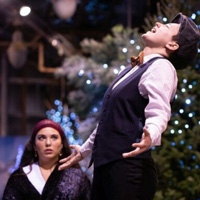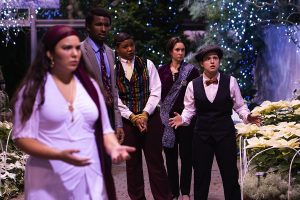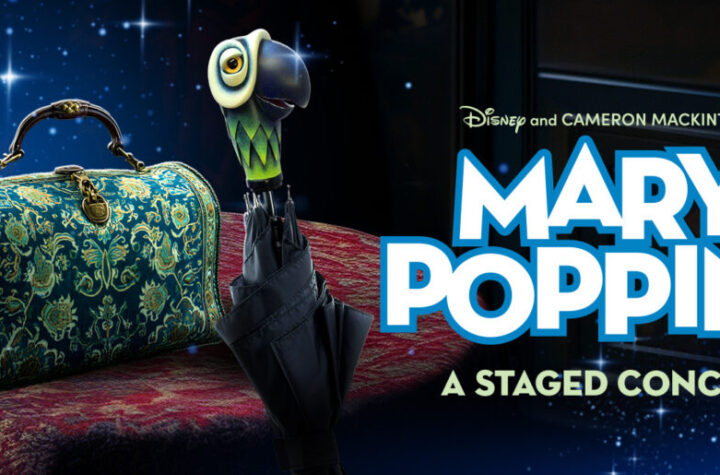
 Somewhat Recommended ** The Lincoln Park Conservatory becomes the backdrop for the audience’s “voyage through Illyria” during Midsommer Flight’s “Twelfth Night: An Immersive Journey”, adapted from William Shakespeare. This show is unique with its creative staging, using the backdrop of Chicago’s acclaimed botanical venue. As the audience traverses from one room to the next, we get to experience many of the highlights of Shakespeare’s original tale, including interfacing with the many characters that he once created. In the course of the performance, we also get to behold the live plants that populate the pathways as well as the seasonal decorations that celebrate the warmth of the holidays. In addition, today’s script has been tailored to suit the immersive experience and supplemented with additional text plus original music. Being at the Conservatory cleverly takes us back in time to a long bygone and magical era and gives us the opportunity to appreciate the importance of love and friendship during the Christmas season and throughout the year, minus modern-day contrivances. What I liked most about the show was the energy that the actors put into it. They were excellent in their mastery of Shakespearean English, and their body language was intense and fluid. The actors and musicians were busily frolicking and seemed happy. But how happy was the audience? In my opinion, despite the best of intentions, the production did not live up to its lofty promise. For many reasons (which I have yet to explain), the Lincoln Park Conservatory is the wrong venue for this show.
Somewhat Recommended ** The Lincoln Park Conservatory becomes the backdrop for the audience’s “voyage through Illyria” during Midsommer Flight’s “Twelfth Night: An Immersive Journey”, adapted from William Shakespeare. This show is unique with its creative staging, using the backdrop of Chicago’s acclaimed botanical venue. As the audience traverses from one room to the next, we get to experience many of the highlights of Shakespeare’s original tale, including interfacing with the many characters that he once created. In the course of the performance, we also get to behold the live plants that populate the pathways as well as the seasonal decorations that celebrate the warmth of the holidays. In addition, today’s script has been tailored to suit the immersive experience and supplemented with additional text plus original music. Being at the Conservatory cleverly takes us back in time to a long bygone and magical era and gives us the opportunity to appreciate the importance of love and friendship during the Christmas season and throughout the year, minus modern-day contrivances. What I liked most about the show was the energy that the actors put into it. They were excellent in their mastery of Shakespearean English, and their body language was intense and fluid. The actors and musicians were busily frolicking and seemed happy. But how happy was the audience? In my opinion, despite the best of intentions, the production did not live up to its lofty promise. For many reasons (which I have yet to explain), the Lincoln Park Conservatory is the wrong venue for this show.
Let’s start from the beginning. Before we walk from the lobby into the first room of plants, we are warned about the uneven lighting and the heat inside. (Yes, it was most definitely above 80 degrees and quite humid: a great environment to grow tropical plants but not necessarily to watch a performance.) We are also told to expect that our group of thirty would be split into several and rejoined at the end; in that way, we would all immerse ourselves into different parts of the tale, each led by various actors (and also by the stage manager and two assistant stage managers). The oral and written instructions we are given ahead of time are as follows: “If a character invites you to follow them as a request, you have the option to say “yes” or “no.” If you are told to follow them, you must. So my guest and I intentionally split up so that we would have a different experience. The plan was that after the show, we’d compare notes.
The house opened at 7:15 p.m., and we were invited to tour the first room of tropical plants before the show began and we were instructed to return to the front five minutes before the official start of 7:30 p.m. It turned out that once the music began, the show actually started maybe seventy-five feet away from the lobby doors. Granted, this was not far away, but we were all waiting in the wrong place, so we had to hustle to get to the first scene. Then too, we were instructed in advance to maintain at least six feet away from the actors (presumably due to COVID requirements). However, when the actors introduced themselves, they were practically on top of us, because the pathway on which we were standing was much too narrow. I tried to move back as far as I could away from the actors without tripping over the hose that separates the path from the restricted garden area.
The cast includes: Amy Malcom (Olivia), Kathleen Mitchell (Antonio), Tatiana Pavela (Maria), John Payne (Viola), Lexy Hope Weixel (Sir Andrew Aguecheek), Grant Brown (Sir Toby Belch), Polley Cooney (Orsino), Sonia Goldberg (Malvolio), Izis Mollinedo (Feste), Audrey Napoli (Sebastian), Jillian Leff (Ensemble), and Kristen Alesia (Ensemble). The choice of cast members to play certain roles leads to another issue with this production: When an actor who identifies as female plays a male (or vice versa) or when a nonbinary or transgender person plays multiple roles, for example both a man and a woman, all this can become difficult to follow. (And it’s not that I’m being overly traditional here!) I recognize that costuming can be a guide regarding who or what a character is supposed to be, but that isn’t completely successful. Yet the costumes are relevant to the time period, thanks to the work of costume designer Cindy Moon.
The musical numbers are great, with original music composed by Elizabeth Rentfro and Alex Mauney and additional music by Grant Brown, Caroline Kidwell, and Lexy Hope Weixel. My favorite instrumentalist happened to be the cellist later on in the performance. But with different segments of the audience seeing different things in a different order, we were all not treated to the exact same music. To my mind, the music was probably the best part of the show or certainly the part that we could most easily hear and understand. That brings up the audio problem with the entire show. Unfortunately, the Lincoln Park Conservatory does not lend itself to the best acoustics, because it is not built for the purpose of amplifying sound. Since the actors are not wearing microphones, a lot of the dialogue gets lost in the cavernous rooms. The problem is amplified when the actors talk in Shakespearean English at some remove from the audience. (Later on, I learned that my guest not only had a hearing problem with the show, but she was also upset about the lack of a handrail on one of the staircases. Luckily, some gentleman kindly offered his hand to help her up the stairs.)
Then there are issues with the visuals. The worst sightlines are in the “Show Room”, which is quite lovely with decorated Christmas trees and seasonal trimmings. However, the one huge Christmas tree in the middle blocks the view of the actors, and not one person in the audience could take in the whole panorama. Then there are some other places like the “Fern Room” where the ferns hang down so low so as to block one’s view of the performers. On the night I was in the audience, some people sat down on the concrete or crouched down or knelt in order to watch a scene. For me, the weirdest part of the evening was the combination of bad acoustics with the actors being a distance away and my view being blocked by a big fern. Note that the plants are often in darkness; they are not brightly lit, which makes things worse.
Then too, we were rotated in such a fashion that we kept returning to the same rooms where we had previously been, which seemed like needless repetition. All told, the performance is mostly 100 minutes of being on our feet with an occasional chair along the path. Sitting in a random chair every so often turned out to be important: Since there are no chairs in the lobby as we were assembling (and since my guest and I had shown up about 50 minutes in advance), it got wearying to stand practically the whole time, or 50 minutes plus an additional 100.
The biggest takeaway from this performance is that all types of love can be expressed and acknowledged in traditional and nontraditional forms. This includes romantic love, sibling love, unrequited love, etc. To love another person fully and authentically is a precious thing, regardless of the gender or gender identification of the partners involved. But watching this show is much too much work. Despite the fact that the actors seem to enjoy themselves, I cannot say the same for the audience. The rooms were too warm, and it was hard to hear. As much as I love walking through the Lincoln Park Conservatory in the daytime hours, its purpose is to view the exotic plants and not to host a show. Most certainly any production here would be better seen during daylight hours, when the lighting is more uniform and the audience can get a better sense of being in a garden. But there are only evening performances of “Twelfth Night”, and in addition to the heat and the poor acoustics, the lovely plants in silhouette regrettably block our view of much of the action.
Midsommer Flight’s “Twelfth Night”, directed by Kristina McCloskey, is playing at the Lincoln Park Conservatory, 2391 N. Stockton Drive, Chicago, through December 19, 2021.
Tickets are pay-what-you-can. Suggested donation $30.00
Performances are Thursdays through Sundays at 7:30 p.m.
Reservations are strongly recommended due to a limited capacity of 30 per performance and can be made through the Midsommer Flight website https://midsommerflight.com/.
To see what others are saying, visit www.theatreinchicago.com, go to Review Round-Up and click at “Twelfth Night: An Immersive Journey”






More Stories
“Mary Poppins : A Staged Concert” reviewed by Julia W. Rath
” I and You”
“Johnny Cobweb” reviewed by Mark Reinecke